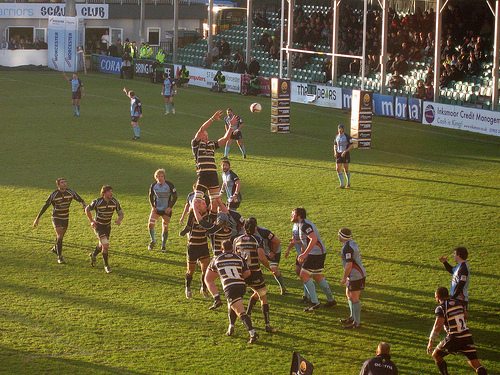Professional rugby player calls it quits
When James Whybrow arrived at Warwick he found himself in the unique position of balancing a demanding law degree and a professional sports career on the books of Worcester Warriors Rugby Club.
I spoke to James to discuss what is required to perform at the highest level in two completely separate fields and whether it was this juxtaposition that ultimately led to the end of his professional rugby career.
Tom: I think the best place to start is to ask how your journey in rugby began.
James: I never initially liked rugby. I was really reluctant and in my first year of secondary school I don’t think I even played. I’d always been playing football and then got to secondary school and they didn’t have a football team and I remember being really upset.
T: Did your friends play rugby?
J: No, originally they liked football. But as more and more of my friends started to play I got more and more into it. Back then I had no skill – I just used to run around.
T: Were you competitive at school?
J: Completely. At that age that was something that drove me. If I ever heard someone talking about a good player, I wanted to be better than them.
T: What were school games like for you at that age? Did you stand out from the rest?
J: I’d score without fail every single game at least two or three tries. The great thing was that the better I got the more people started hearing about me and at school that intimidation factor played a huge part.
I don’t think certain traits will ever leave me. I’m still very competitive. I’ve gained some incredible skills from rugby and there may even come a time when I really start to miss it
T: When did you realise that your standard was probably as good as it got?
J: We had a Greater Birmingham tournament every year between big rugby schools in Birmingham. I was 14 and I scored 15 tries in four games. All of our moves would be geared towards me getting the ball and scoring. But it wasn’t until Worcester took me for a trial that I started thinking seriously about the possibility of making it.
T: What was the trial like?
J: You did a two-month trial training twice a week. It was intense because you knew what was at stake. I got signed part-time by Worcester and I also played for England at that age. When I was 15 I got called up to the Under 16s. It was an absolutely ecstatic moment. Everything that I had worked for – I had so many weeks away from home and had played in lots of different tournaments.
T: What did that feel like?
J: I remember thinking if this is what it’s like to have a professional career then that’s what I want. It was unreal.
T: Did anyone now famous play in that team?
J: Owen Farrell played in that team.
T: How does it make you feel to know you’ve played alongside people like that?
J: Owen played in the Lions this year and I always wonder what got him there considering I felt on a level playing field at 15. But then again I’m also proud of him.
T: So Worcester offered you a full-time contract. Why were your studies so important if they were offering you everything?
J: I’m very conscious that there are no guarantees in sport and secondly I’m a bit of a control freak. I wanted to be good at everything and succeed in every aspect of my life. It was like this really, until my groin injury, which meant I was left out of the England set-up for a few years. I can be quite defeatist at times and take things badly, and I thought I needed something else to pursue and be the best at.
T: What happened after sixth form?
J: I went to Worcester full time and that was a frustrating year for rugby. The club had just been relegated and they weren’t very focused on bringing the youth through. I never really felt like things were progressing as fast as I wanted them to. It was after that year that I decided to go to university.
T: So you made the decision to come to Warwick.
J: Yes. But my choice was purely based on location. I literally aimed for the highest-ranked university near Worcester. I would wake up at half past six to train in Worcester before 10am lectures. I was working my a*** off and didn’t feel like my efforts were being appreciated. I just started to fall out of love with the game and then because I wasn’t playing, Worcester put me out on loan with Coventry.
T: So how did things at Coventry end?
J: It was ultimately because of injury. Having had a good end of the season with Coventry I signed with them for my second year of uni. I played the first game of the season but I was plagued by an injury that wiped out the season. That year was the straw that broke the camel’s back for me really. I was so frustrated, so powerless and so unable to get what I wanted that I finished that season with Coventry, and didn’t feel like re-signing. It was at this time that I really started to immerse myself in other things and starting to think about alternative careers.
I don’t think certain traits will ever leave me. I’m still very competitive. I’ve gained some incredible skills from rugby and there may even come a time when I really start to miss it. It’s given me time to focus on my final year, but most of all it’s given me some time to myself.

Comments